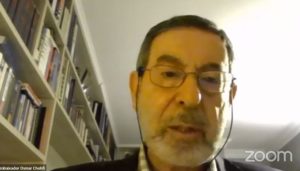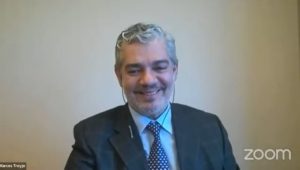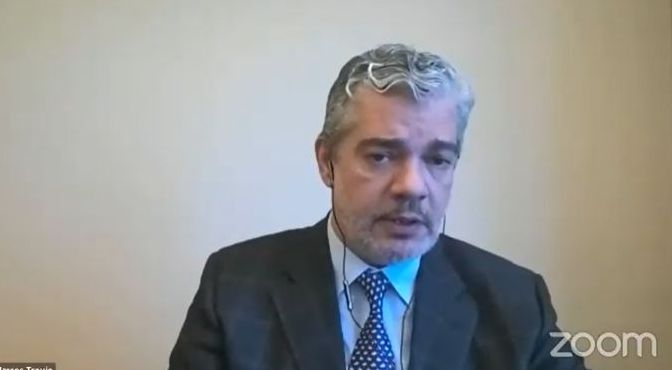São Paulo – International trade is crucial for the development of the countries and has been the driving force behind the world’s strongest economic rises over the last seven decades. So said on Tuesday (8) Brazilian economist Marcos Troyjo (pictured above), president of the New Development Bank (NDB), in a webinar on the international trade outlook held by the Arab Brazilian Chamber of Commerce (ABCC). The webinar got some 340 viewers from Brazil and elsewhere.
“International trade is almost a precondition for the economic growth. It is the largest driving force for prosperity in countries in different stages of development,” Troyjo said. Mentioning the doubts regarding emerging markets and the continuation of the pandemic, the economist said there has been a cloud of uncertainty over the world in early 2022, but he listed some certainties that could guide those who work with foreign markets, including how crucial it is to bet on international trade.

“If we scanned all the great examples of economic miracles and strong economic rises in the last seven decades, it’s absolutely impossible to find a single success case that hasn’t been boosted by the international trade,” Troyjo said, mentioning China, Japan, Germany, South Korea, Singapore, Chile, Uruguay, Spain and the United Arab Emirates. He listed Brazil, Argentina, Turkey and Russia — the last two for a short period of time — as examples where foreign trade does not account for a larger share of the gross domestic product (GDP).
Troyjo underscored the importance of this message in the current context, which sees a protectionist, or precautionary, trend. Departure from international agreements, a self-absorption of countries, a decrease in cooperation and global supply and substitution of imports are seen by Brazilians as a major risk, he says, as experience shows that foreign trade is a steppingstone for development.
Other certainty presented by Troyjo was the increasing importance of emerging economics in the international trade. The economist said that the G7 countries – the United States, Japan, Germany, United Kingdom, Italy, and Canada – saw a combined GDP based on purchasing parity power (PPP) in 2021 of USD 42 trillion. In the seven largest emerging economics (E7) – China, India, Russia, Indonesia, Brazil, Mexico and Turkey – the GDP based on PPP was USD 53 trillion.
In this set of emerging economies, Troyjo included the Arab countries, whose GDP (PPP) is USD 5 trillion. “It’s a very, very relevant, large-sized, dynamic market that will surely affect trade,” he said. He added that Brazil exported to Egypt in 2021 more than it sold to Australia, Israel, Ukraine and New Zealand combined. To Bahrein, it sold more than to Norway.
The place of labor
Another trend the economist pointed out was the reconfiguration of global value chains, leaving behind the international division of labor, where research and marketing activities were based on the US and Europe, while manufacturing plants were based in low-paid countries. “Of course, it still remains, and to some extent it’s still an important reference, but it’s been changed,” he says. According to Troyjo, this change is not only geopolitical now but due to the development of economies.

The economist talked about Brazil’s position as an exporter of commodities in the international market. “There’s no problem at all in being a large exporter of commodities. One of the countries that produces and exports the most commodities in the world is the US, which is also the country with the largest patent stock in the World Intellectual Property Organization, one of the most innovative countries in the world,” he said. He said that the key is adding value, and that Brazil could leverage its benefits in the production of foodstuffs or ore, for example, by adding value to them.
Troyjo presented a fourth trend, which is the new model of international agreements. “For a long time, international agreements addressed tariffs, export and import ratio. Now we’re living a moment in the world that we could call the fourth generation of international treaties,” he said. According to him, the new agreements take into account intellectual property law, environmental protection and sustainable development practices, government procurement, local content policies, and others.
Troyjo at the NDB
The lecturer has been the president of the NFB for almost two years. The institution is a bank established by the BRICS states – Brazil, India, Russia, China and South Africa – to support infrastructure and sustainable development projects in these countries. New members have been recently admitted to the NDB: Uruguay, Bangladesh, UAE, and Egypt. The institution has a portfolio of projects worth USD 32 billion in areas such as water, sanitation, roads, railways, urban metro systems, and clean energies.
ABCC
ABCC president diplomat Osmar Chohfi opened the webinar on the international outlook, which also featured the presentation of the entity’s schedule of activities for 2022, the year it turns 70. Besides talking about the special date, Chohfi addressed the foreign trade, giving an outlook of Brazil’s current trade with the Arab countries. Brazilian exports to the Arabs grossed USD 14 billion last year, up 26% from 2020, while imports reached USD 10 billion, up 82%.
But Chohfi said that there are opportunities for improving this trade and the entity will work towards diversifying exports, signing new free trade agreements and implementing direct logistics lanes. He mentioned some of the following activities like participating in food and beverage show Gulfood that takes place in Dubai later this month and where the ABCC will have a booth to showcase a large number of value-added products.
Here’s more on this:
Watch the full webinar on YouTube:
Translated by Guilherme Miranda




